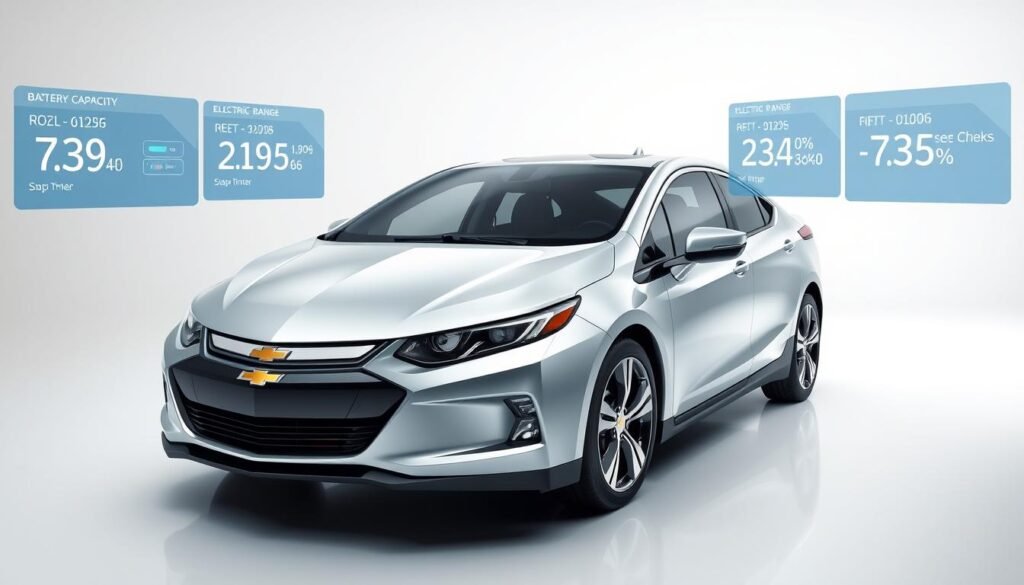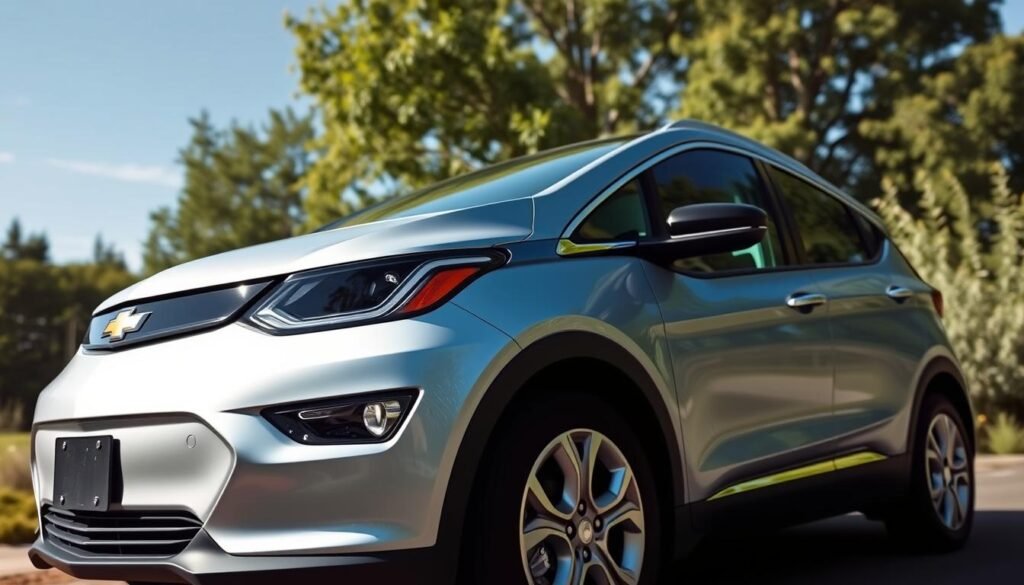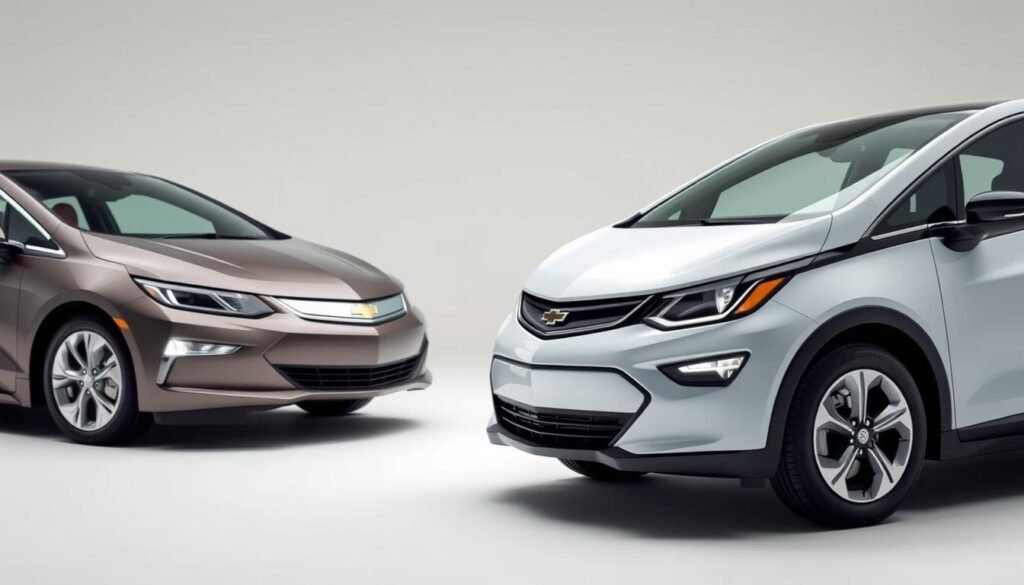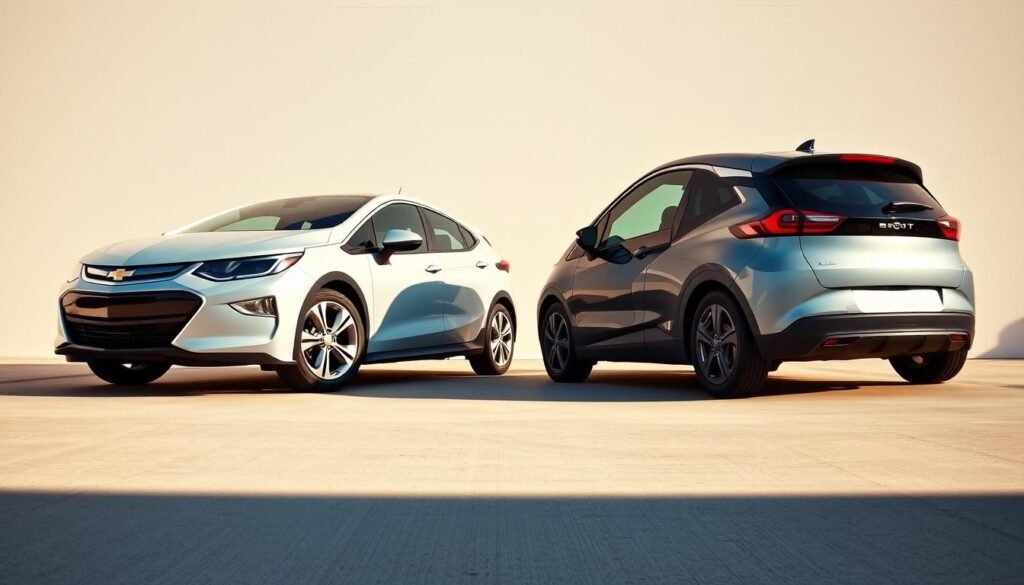Chevy Volt vs Bolt: Electric Model Showdown
Are you trying to decide between the Chevy Volt and the Bolt? This showdown will highlight their main differences.
You’ll get to know their unique styles, functionalities, fuel efficiency, and cost of owning one. This piece will help you make a smart choice when looking into electric cars.
We’ll look closely at what makes the Chevy Volt and Bolt special. This will show you the good and bad of each car.
Whether you want the hybrid Volt or the fully electric Bolt, you’ll get the info you need. Let’s explore these Chevy models to see which one meets your driving needs.
Introduction To Electric Vehicles
Electric vehicles (EVs) are becoming more popular as people look for greener options. This trend is due to environmental worries and new car technologies.
You’ll learn about different EVs, like hybrids and fully electric models such as the Chevy Volt and Bolt.
Electric vehicles help make the air cleaner by cutting down emissions. By choosing EVs, drivers help the planet. Plus, EVs can save money on fuel over time.
More charging stations are popping up all over the United States, making it easier to own an EV.
This growth means less worry about running out of charge. It shows a bright future for EVs, pushing more people towards eco-friendly driving.
Overview of The Chevy Volt
The Chevy Volt shines in the plug-in hybrid market. It mixes electric and gas power. This suits those who like saving energy and still using regular gas.
The dual power system switches smoothly between electric and gas. This makes driving it a great experience.
Chevy Volt Specs
| Specification | Detail |
|---|---|
| Battery Range (Electric Only) | 53 miles |
| Total Range (Gas + Electric) | Over 400 miles |
| Horsepower | 149 hp |
| Torque | 294 lb-ft |
| Fuel Efficiency | 40 to 50 MPG combined |
Performance and Fuel Efficiency
The Chevy Volt has great performance for daily use. It’s got enough torque and smooth handling.
Plus, it’s very fuel-efficient, giving 40 to 50 MPG in electric and gas modes. This makes the Volt perfect for long trips without worrying about battery or gas.

Overview of The Chevy Bolt
The Chevy Bolt shines in the electric car world. It’s made for today’s drivers, focusing on your needs.
It offers great range, many charging options, and a price that won’t break the bank.
Chevy Bolt Range and Charging
The Chevy Bolt travels about 238 miles on one charge. It’s good for daily use and long trips.
You have lots of charging choices, from home setups to fast charges in public places.
Charging is easy, whether at home overnight or at a station, keeping you on the go without hassle.
Cost and Affordability
The Chevy Bolt is priced well against other electric cars. Starting affordably, it also offers a chance for a $7,500 federal tax credit.
This credit makes it even more budget-friendly. It’s considered a smart buy for eco-friendly transportation.

Chevy Volt vs Bolt: Key Differences
The Chevy Volt and Chevy Bolt offer different takes on eco-friendly driving. Knowing the Chevy Volt vs Bolt differences will guide your choice.
The Volt is a hybrid, using both gas and electricity. This means it can go further without needing a charge. The Bolt is fully electric, meaning no emissions at all.
Bolt driving costs less as it uses electricity. But, if long trips are your thing, the Volt’s hybrid setup is handy—it uses gas when the battery is low.
Also, Volt needs gas engine checks, while Bolt mostly needs its electric parts looked after. Choosing between a hybrid and an electric car depends on what you value.
If you’re into helping the environment and short drives, go for the Bolt. If you like having a gas engine just in case, the Volt might be better for you.
Each model offers benefits that fit different lifestyles and driving needs.

Hybrid vs Electric: What’s The Difference?
Knowing the difference between hybrid and electric cars is key to choosing the right one. Hybrids, like the Chevy Volt, use both a regular engine and electric power.
This mix lets drivers use two kinds of fuel. Electric cars, such as the Chevy Bolt, only use electric power, which cuts out the need for gas.
What is The Hybrid Model?
Hybrids blend electric power with traditional gas engines. They provide a unique driving experience, shifting between the engine and electric motor as needed.
The Volt is an example that acts as a step toward fully electric cars. Many people find the better fuel efficiency appealing in the hybrid vs electric debate.
Benefits of All-Electric Vehicles
Electric vehicles have many benefits that attract eco-friendly and cost-conscious buyers. Here are some main advantages:
- Significantly lower operating costs due to minimal fuel expenses and fewer moving parts.
- Reduction of carbon emissions, contributing to a cleaner environment.
- Decreased maintenance needs, as electric vehicles require less frequent service than hybrids.
- Positive driving experience characterized by instant torque and quiet operation.
The upsides of electric cars are getting more recognized, leading to a bigger shift towards them.
Performance Comparison: Volt vs Bolt
Looking at the Chevy Volt and Bolt, they both provide unique driving experiences. The design and powertrains of each model have a big influence.
The Volt has a hybrid engine, and the Bolt is fully electric. This makes driving them feel different.
Acceleration and Drive Experience
The Chevy Volt picks up speed smoothly, suited for those liking a classic drive but with less gas use. The Bolt, though, zooms off the start line, thanks to its electric motor.
This makes for a thrilling drive. Each car gives a special feeling when driving because of these differences.
Handling and Comfort
The Volt is made for a comfy, balanced ride, perfect for longer trips. Its suspension softens the bumps on the road.
The Bolt is tuned for excitement, with tighter handling and strong cornering. It’s great for drivers who enjoy a lively ride.

Range Anxiety and Fueling: Volt vs Bolt
Range anxiety is a big worry for people thinking about getting electric cars. Learning about the Chevy Volt and Chevy Bolt can help ease this worry.
They have different ways of charging and fueling to fit your driving needs.
Daily Range Requirements
When looking at range anxiety, think about how much you drive each day. The Chevy Volt has a backup gas engine, letting you go farther without needing a charging station.
It can go about 53 miles on electricity alone, but gas can extend your trip. The Chevy Bolt, though, has a 259-mile electric range. It’s enough for most day-to-day drives.
Charging Infrastructure Availability
Finding charging stations is key for electric car owners going on long trips. As more charging spots pop up, it gets easier to charge on the go.
Big cities have lots of fast chargers, especially at workplaces and public spots. The Chevy Bolt gets more from this growing network, making long trips easier.
But, Volt drivers might use gas stations more on longer trips. It shows the balance needed between electric and traditional fueling.
| Feature | Chevy Volt | Chevy Bolt |
|---|---|---|
| All-Electric Range | 53 miles | 259 miles |
| Gasoline Backup | Yes | No |
| Typical Charging Locations | Gas stations | Charging stations around town |
| Fast Charging Availability | Limited | Widely available |
Looking at these points helps in deciding how to deal with range anxiety. Knowing about charging spots and how far each car goes can make moving to an electric car easier.
Cost of Ownership: Volt vs Bolt
The cost to own a Chevy Volt or Bolt isn’t just the price tag. Think long-term. Costs and savings down the road matter a lot.
Electric vehicles, like these, can save you money on upkeep. We’ll look at how much you’ll spend on keeping them running and their effect on our planet.
Maintenance and Repair Costs
The Chevy Volt needs about $550 each year for upkeep. This depends on things like how old it is, where you live, and how much you drive.
Stuff like changing coolant and fixing the air conditioner are common costs. Since the Volt is both electric and gas, it usually needs more care than all-electric cars.
On the other hand, the Chevy Bolt EV is all electric. Expect to spend about $40,605 on it over five years. This includes its loss in value, loans, insurance, and fixing it up.
Without oil changes or transmission work, which gas cars need, the Bolt costs less to maintain. So, going green can also save you some green.
Environmental Impact and Emissions
The Volt and Bolt have very different impacts on the earth. The Volt can go about 53 miles before needing gas.
This means less fuel use for your daily drives but it still needs gasoline. The Bolt, though, can go about 238 miles without gas.
This is better for the planet, especially as more green power comes online. Choosing the Bolt means you’re helping the earth more. It has no exhaust, so it’s better for the air and fighting climate change.
The Volt is better than regular cars but still pollutes a little because of its gas engine. For those who care about the earth, the Bolt is the better pick.
| Vehicle Model | Average Annual Maintenance Cost | Total 5-Year Ownership Cost | EPA Estimated Range (Electric) | Emissions |
|---|---|---|---|---|
| Chevrolet Volt | $550 | $40,775 | 53 miles | Lower than traditional vehicles |
| Chevrolet Bolt EV | Minimal | $32,710 | 238 miles | Zero emissions |
Best Electric Vehicles: How Do They Rank?
The Chevy Volt and Bolt are key players in the electric vehicle (EV) market. They face stiff competition from brands like Tesla, Nissan, and Ford.
It’s important to look at performance, cost, and how happy customers are with these cars.
Comparing Volt and Bolt with Competitors
The Chevy Volt and Bolt offer unique perks that attract different buyers. Here’s a look at how they stack up against top rivals:
| Vehicle | Range (Miles) | Starting Price ($) | Consumer Satisfaction (out of 10) | 2023 Model |
|---|---|---|---|---|
| Chevy Volt | 53 (EV Mode) | 33,000 | 8.5 | Yes |
| Chevy Bolt | 259 | 26,500 | 9.0 | Yes |
| Tesla Model 3 | 267 | 42,000 | 9.5 | Yes |
| Nissan Leaf | 226 | 27,000 | 8.0 | Yes |
| Ford Mustang Mach-E | 300 | 43,000 | 9.2 | Yes |
The table shows the Chevy Bolt has a long range and a good price. The Volt is great for those who want a hybrid.
This info helps compare the Chevy Volt and Bolt with other top models. It makes choosing the right one easier.
Conclusion
As we wrap up our Chevy Volt vs Bolt discussion, let’s consider what makes each car special. The Volt, being a hybrid, uses both electric and gasoline power.
This makes it great for those new to electric cars. On the other hand, the Bolt is fully electric.
It offers more range and less impact on the environment, perfect for the eco-conscious. Consider what’s important to you, like driving habits and budget.
The guide we went through gives you the info to choose wisely. In the end, the best car for you depends on what you value and need in your life.
The Chevy Volt and Bolt both play a big part in the electric vehicle world. Knowing what sets them apart helps you pick the right one. This way, you can help make the future of transport greener.
FAQs
What is the main difference between the Chevy Volt and Bolt?
The Chevy Volt is a hybrid that uses both electric and gasoline power. The Chevy Bolt runs only on electric power.
How far can the Chevy Volt drive on a single charge?
On just electric power, the Volt can go about 53 miles. It can travel over 400 miles using both electric and gasoline power.
What is the driving range of the Chevy Bolt?
The Chevy Bolt can travel around 238 miles with just one charge. This makes it very competitive among electric vehicles.
How do the maintenance costs compare between the Volt and Bolt?
Both cars cost less to maintain than gas vehicles. But the Bolt, with fewer parts, might save you more money over time.
Are there any federal incentives available for purchasing these vehicles?
Yes, the Chevy Bolt buyers might get a ,500 federal tax credit. The Volt’s hybrid nature means it might have different rules for credits.
What charging options are available for the Chevy Bolt?
The Bolt has many charging choices, including standard home charging and fast DC charging for quicker charges.
Which vehicle is better for long-distance driving?
For long trips, the Volt might be better since it has a gasoline extender. The Bolt relies on electric charge, needing careful planning for long journeys.
How do the environmental impacts of the Volt and Bolt compare?
Both reduce emissions more than gas cars. Yet, the Bolt has no emissions, being fully electric. The Volt has lower emissions with its hybrid system.







